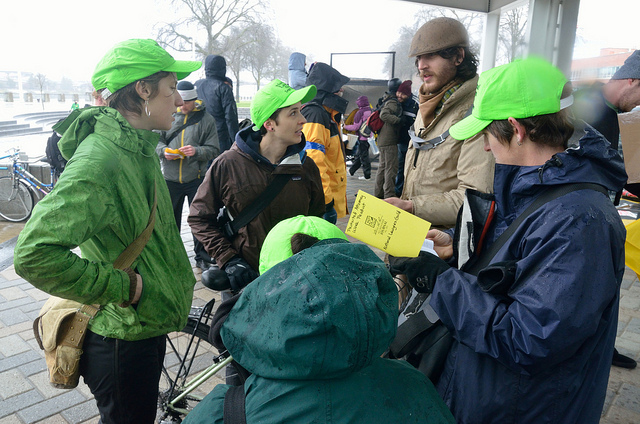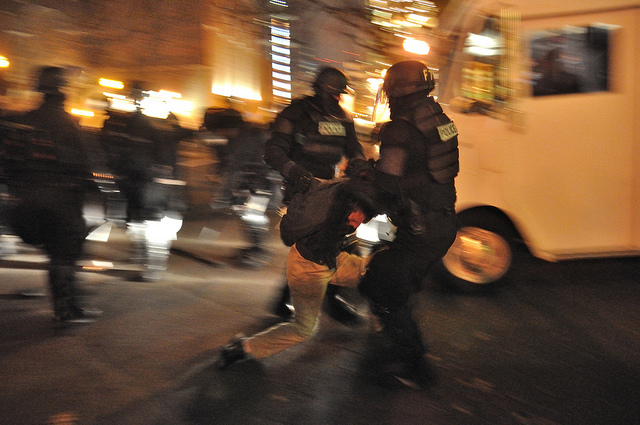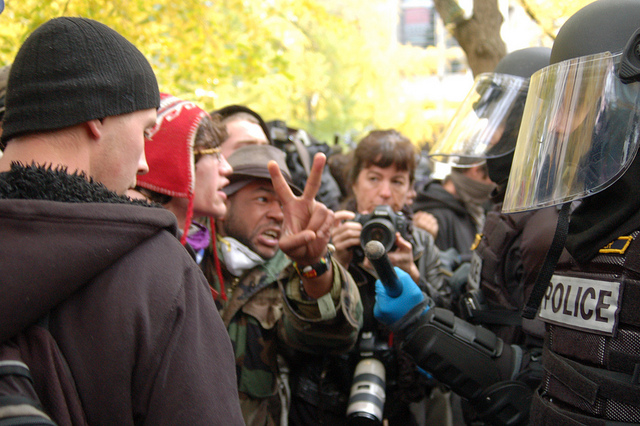By Jackie Miller
Out of the Courthouse, Into the Streets
Most Monday afternoons since early this year have been “Occupy Monday” at Judge Cheryl Albrecht’s courtroom. In Multnomah County Circuit Court, room 428, Judge Albrecht has had dozens and dozens of Occupy defendants on her Monday docket—all those charged with violations at protests, who plead not guilty. I too was arrested on Main Street on October 13th, and at the eviction from Chapman and Lownsdale Parks on November 13th. Since then, I’ve been working to support other arrestees and following their cases as best I can.
Usually violation cases would be heard in violations court and not treated with any gravity. Thanks to intervention from attorneys with the National Lawyers Guild (NLG) who are representing some of the Occupy defendants pro bono, in December we won a motion to have our cases heard by a Circuit Court judge. Judge Albrecht drew the straw, and since then she’s heard an earful about why we’re standing up for our constitutional rights, in the street and in the courtroom.
This Monday, March 12th, the courtroom was packed full all afternoon, a reunion of defendants from Main Street and Jamison Square in October, Chapman Square and Chase Bank in November, Shemanski Park in December, and more. Those with more serious charges (misdemeanors or felonies) are still waiting for trial, most likely in other courtrooms. Those with federal charges at Terry Schrunk Plaza have already had all charges dropped by the Feds. To understand what the rest of us were doing there Monday, let me catch you up on our legal battles so far.
Public Access
In January, Judge Albrecht heard motions from attorneys representing some of us arrested at Main Street and at Jamison Square. These included a motion to drop charges against Main Street defendants because police prevented our friends and supporters from entering the Justice Center for our arraignments. The Oregon State Constitution clearly specifies that the public is entitled to open access to court proceedings, including arraignments. Seven activists testified that we or our friends were prevented from entering the building.
Justin James Bridges, still in a wheelchair since being attacked by police at the November 13 eviction, testified that even when he showed his sign-language interpreter card and demanded to be allowed to enter in case hearing-impaired protesters were at the arraignment, he was stonewalled and ultimately denied entry. Since Justin couldn’t get to the witness stand in his wheelchair, Albrecht left the bench to take a lower seat so she could better observe his testimony. She expressed sympathy on a personal level for his arm injury, which continues to prevent him from interpreting for the deaf, including the deaf community within Occupy.
Unfortunately, we lost that motion. In her decision, Albrecht acknowledged that the sheriff’s deputies “could have been more careful” to ensure our constitutional rights were met, but since a media camera was in the courtroom and no family members were excluded, she did not grant the motion. Still, we took a stand against the state’s disregard for the public’s constitutional rights and if they attempt to deny us access to a public hearing without cause again, we will demand that right.
Constitutional Rights at Trial
Another motion heard in January resulted in a groundbreaking ruling that helps to protect our constitutional rights at trial. In the vast majority of Occupy cases, the police arrest and book us for alleged misdemeanors (like disorderly conduct, interfering with a “peace” officer, or trespass), but later the District Attorney’s office drops the misdemeanor charges to violations, which are non-criminal charges similar to traffic citations. For years, the DA has been using this ploy to deny defendants the right to a court-appointed attorney and jury trial (both expensive for the government), as well as a standard of proof beyond reasonable doubt and other constitutional rights granted to criminal defendants. All of these things would be provided for a misdemeanor trial, but not for a simple violation.
Attorney Bear Wilner-Nugent argued the motion and defendants Keller Henry and Deb Norton gave powerful testimony of how egregiously they were treated while being arrested for something the state later decided was no more serious than a traffic ticket. Albrecht largely decided in our favor, and we won the rights at trial that criminal defendants get. In other words, if the police treat us like criminals when they arrest us, the DA can’t turn around and deny us the constitutional rights at trial that criminal defendants must receive. (See the ELK legal collective for more details on that ruling and what it means for us as activists.) We hope this ruling will have implications beyond the immediate cases, helping to protect the public at large from harassment arrests by police.
Albrecht did make one exception to her ruling—one that seemed minor at the time, but that is now being milked for all it’s worth by the DA’s office, as we shall see. She ruled that only charges originating as class A and B misdemeanors are entitled to a court-appointed attorney and jury trial. Class C misdemeanors (like trespass) dropped to violations get the certain protections (including a standard of proof beyond reasonable doubt, instead of merely preponderance of the evidence), but no jury trial or public defender. The rationale is that the fines are lower, so the charge is less punitive. Of course, whether a fine is easily affordable or punitive depends on a person’s means.
Occupiers Defend Themselves: The First Four Trials
Over the last few weeks, four Occupiers took a stand for their rights and defended themselves at trial in Albrecht’s courtroom. None of them had legal counsel, as there are only enough volunteer attorneys for a small percentage of our cases and three of the four were not entitled to a court-appointed attorney, according to the judge’s ruling. The fourth preferred to go to trial rather than make another costly trip from out of town.
The state brought in a parade of arresting and supervising police officers to testify at the trials. The Deputy DA, as prosecuting attorney, took full advantage of the lack of legal experience of the defendants by asking leading questions of witnesses. The defendants, in turn, took the opportunity to make important political points. Jesse Baumhauer, arrested in the lobby of Chase Bank on N17, turned to the Deputy DA and said, “Did I know that I was being asked to leave by Chase Bank, an institution that’s caused the collapse of the global economy, and not a single person responsible has spent any time in jail for it? Yes. Did I expect that I would get arrested and jailed for protesting that? No.”
Daniel Wallace, also arrested at Chase, had the opportunity to confront his arresting officer, Robert Clevenger, under penalty of perjury. He asked him, “Is it normal PPB procedure when arresting peaceful protesters to threaten broken bones?” The officer denied recollection of telling Daniel, “I’ll break it, I’ll break it, I’ll break it!” regarding Daniel’s left arm, locked with another protester’s arm. Apparently, there is no PPB protocol for when peaceful protesters have locked their arms.
In his trial, Xavier Kyneston admitted that he was aware of broadcast instructions from the PPB PA van (aka the “ice cream truck”) to leave Chapman Square on November 13, but pointed out that he was also aware of his friends getting beaten with clubs in front of his eyes. So, he preferred to keep a sturdy piece of plywood between himself and those clubs. When asked if he had anything he wanted to submit to the record as evidence, he said, “Yes, I have this drawing I made of myself looking sad if you find me guilty.” That got a smile even from the District DA, who did not object.
We all looked sad, and mad, when Albrecht found all four defendants guilty. She said that Jesse’s and Daniel’s arguments had touched on statutory issues of duress and “choice of evils”, but that their testimony didn’t fully reach those standards. Each defendant was fined $100, inclusive of fees. (Defendants who are no-shows at trial dates get automatically defaulted and are being fined $200 per charge, plus fees.) Prosecuting attorney Lowney recommended a $400 fine in the Chase Bank cases, on grounds that Chase was a “civilian victim”—needless to say, that sparked an incredulous outburst in the courtroom. Albrecht kept the fine at $100.
The Arrestee Committee has asked for help with covering the fines for those who went to trial and can’t easily afford the $100. We’re waiting for the Occupy Portland Spending Committee’s decision on the request. If you’d like to help, please donate to the legal defense fund.
We’re Winning
Monday was the deadline for the DA’s office to decide on the state’s response to the constitutional rights ruling. Deputy DA Brian Lowney, who has the unenviable job of prosecuting all of our cases, announced that the DA’s office will not appeal the ruling, an indication that our gains are on solid legal ground.
But instead of dropping all our charges, the state is now trying to drop only the violations that originated as class A and B misdemeanors just to avoid the expense and risk of a jury trial and court-appointed attorneys. All defendants (the majority) who are charged with both class C (trespass) and class A and B charges had their A and B charges dismissed on Monday. Another eleven defendants who didn’t have any class C charges in the first place were arraigned on brand new traffic violations and their A and B charges will be dropped. Only three or four remaining defendants were granted their right to a jury trial. They will proceed to an arraignment on March 27 to request court-appointed attorneys.
There was more outrage in court when this ploy became clear. Attorney Lee Berger, who represents defendant Caitlin Wilson, objected that if the charges were supposedly being dropped in the interest of justice, the result was not just. Deputy DA Lowney said justice was not the reason, the reason was to continue in keeping with the originally stated case goal: to pursue our cases as violations. Nothing about justice or due process there. Attorney Thomas Freedman, who represents me pro bono, objected to the dropping of A and B charges on grounds that charges cannot be dismissed simply to interfere with due process.
Monday’s group of defendants then had the opportunity to plead no contest, request a trial date, or join the group of defendants who are reserving the right to contest Albrecht’s decision about class C charges on appeal, in the event that we’re found guilty at a future trial. Most of us joined this motion for “Exception to the Court’s Ruling Denying in Part the Application of Constitutional Rights.” If any defendants out there missed their hearing on Monday, they can still file this motion before our next court date of April 2 if you want to join. Call the hotline at 503-902-5340 for guidance on how to file a motion. The April 2 hearing at 1:30pm is required.
Several defendants pointed out that they were being forced to make a legal decision, without counsel, that was very convoluted and difficult to understand—ironic, since court-appointed legal counsel was the right we’d just been denied. Phillip Green, arrested at the Shemanski eviction, got a round of twinkles and applause with his inspiring statement (paraphrased):
“The state does not have the right to beat me…arrest me…hog-tie me…detain me…charge me with crimes…and then deny me my Sixth Amendment right to legal counsel. When they were doing all that to me, which of the charges was it for?”
He refused to make a legal decision without counsel, and so Albrecht made it for him (joining him to the “exception” to reserve his rights to contest her decision). Another Shemanski defendant, Tara Parrish, wondered to the court if it’s typical for people to sustain a concussion when being arrested for trespass (considering it’s such a minor charge that it doesn’t warrant a jury trial).
I was surprised that the state isn’t dropping more of our charges altogether. For example, 81-year-old World War II veteran Jack Mongeon was dragged into the melee and arrested at the Chapman eviction on November 13. I saw him leaving the East Precinct with his worried family (I was on the bus in cuffs waiting for processing). He looked frail and shaken, with mud still on his face from when police threw him to the ground. Surely the state isn’t pursuing bogus charges against an elderly veteran? But they are. Likewise, Liz Nichols, who was pepper-sprayed full in the mouth is still fighting charges; her hearing was postponed to April 2.
The most likely reason the DA is pressing forward with as many charges as possible, at great expense to the public, is to try to make it harder for arrestees to go on the offensive and bring wrongful arrest and civil rights lawsuits against the state.
On April 2 and April 30, Albrecht will hear more motions from attorneys with the Protester Project of the Portland chapter of the NLG, and more may be on the way after Monday’s developments. Our attorneys are doing an amazing job of fighting for us tooth and nail, making these arrests of political harassment expensive and difficult for the state. I asked attorney Berger what he made of the day’s perplexing events and he said, “I just think…I just think we’re winning.” Maybe Mondays aren’t so bad after all.
Of course, the real miscarriage of justice is that we’re forced to be defendants in the first place, in a context where the state is inflicting violent political repression and getting away with it (or so they think), while we go to trial for exercising our rights of assembly and political dissent. This bigger picture rarely gets addressed in the morass of narrow legalistic arguments in court, but Occupy defendants are doing our best to bring it into the light of day at every possible opportunity. The state has massive advantages: power, personnel, public coffers, the inertia of the status quo, a system that rewards those who toe the line (like cops willing to perjure themselves). But we have plenty of Davids for their Goliaths. We have the advantage of our humanity, our voices, our love for truth and for each other. And we know that whatever the court’s verdict, love always wins.











4 comments for “Occupy’s Battles in Court”